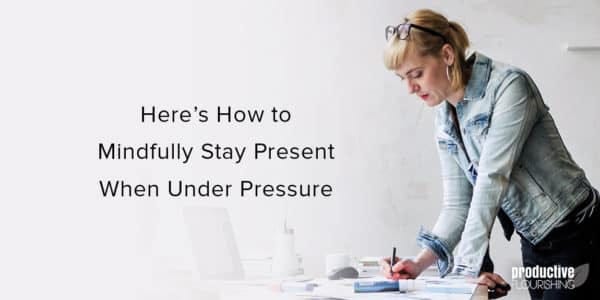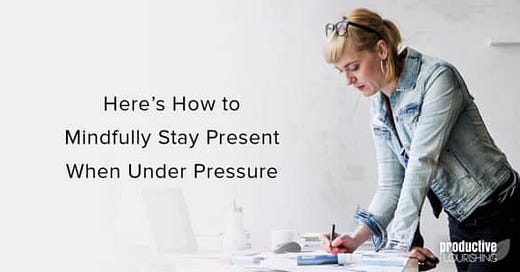Here's How to Mindfully Stay Present When Under Pressure

There’s a lot of talk these days about mindfulness and the importance of staying present. But when you’re in the throes of deadlines and emergencies, it’s extremely difficult to pause and really be in the moment. Maybe you’re a creative professional feeling frustrated with the lack of direction a needy client is going in, or you’ve hit a wall trying to communicate with your boss – or vice versa – and you just couldn’t hold it in anymore. Being in the professional world offers myriad examples of reasons we might lose our cool, and we’ve all had situations where we may have reacted with not as much grace as we would’ve liked.
Yogic philosophy places such importance on being in the present because living in the past or living in the future causes pain. This concept is called “aparigraha” and is one of the 10 Yamas and Niyamas, a set of moral guidelines that break down into five Yamas (restraints) and five Niyamas (observances). Aparigraha is one of the Yamas, and is roughly translated into “non-attachment” or “non-possessiveness”.
Still with me? If reading the above paragraph took you out of the moment and almost away from this post, then think about it like this: as a business owner, team manager, or high-pressure leader, how can you use this idea of non-attachment to stay present in moments of stress?
Learning to Be Non-Attached
The idea of being non-attached is often mistaken for being indifferent. But being able to live in the present and non-attached to your outcomes isn’t about not caring, or being apathetic or avoidant. The idea of being non-attached is about allowing ourselves to care but not cling to the idea of what any outcome, goal, project, or person can do for us.
So how does being non-attached relate to staying in the present? Being non-attached to our outcomes means that we are in control of ourselves, and in control of being all in in the present moment. That by doing the work, trying our hardest, learning from our past, and being hopeful about the future, we are more able to ride the wave the universe has put us on with as little suffering as possible. It doesn’t mean we’ll never experience pain, but it’s more so about being able to monitor it (at best) and eliminate the drastic ups and downs as much as humanly possible.
Don’t Live in the Past
We often take ourselves out of the present moment and create pain by living in the past. Ruminating on regrets or reliving difficult situations means that we aren’t in the here and now, but instead we are replaying a tape over and over of something we cannot change. We all know intellectually that we cannot change the past; that from the things that have happened, we can only learn, grow, and do better or different. So when we dwell on past situations that have caused us pain, we are only robbing ourselves of the current moment and of anything positive and beneficial that could be happening now.
By not being attached to past mistakes or regrets, we are better able to be in the moment. By being able to be more in the moment, we are then able to more fully enjoy the lovely nuanced moments that happen in a day, as well as be ready to take on any new challenges with confidence and clarity.
Don’t Live in the Future
Just as living in the past brings us suffering, so does living in the future. Constantly worrying about possible scenarios, stressing about an upcoming event – or even daydreaming about an exaggerated, fantastical future – takes us out of the present moment because we are living in our made-up future.
No one knows what the future holds (ah-hem, I’m looking at you, 2020), no matter how much we plan, project, or speculate. By constantly worrying or fantasizing about the future, we’re robbed of feeling any joy in the present. This doesn’t mean that you shouldn’t plan for the future, or try to set yourself up for success; these are things you do in the present to help your future self.
Assuming that we know what the future holds means that we aren’t seeing things for how they are right now, for better or for worse. And by being non-attached to those outcomes (the good ones or the bad ones) means that we will continue to find happiness no matter what life throws at us.
Practice Being Present
Is this idea of living in the present, being unattached to outcomes, and existing in a state of unbothered bliss easy? Absolutely not. Is it something that will happen the moment you’re done reading this post? If only it were that easy.
But like anything else worth working for, it’s all about staying in the practice. Keeping these things in mind, recognizing when you’re drifting too far into the past or into the future, and mindfully bringing yourself back to the moment – over, and over, and over again – is what’s important here. Creating the habit and finding just even a few more moments of peaceful calm throughout your day is what it’s all about, and, ultimately, finding those small moments of joy as often as possible, for as long as possible.



